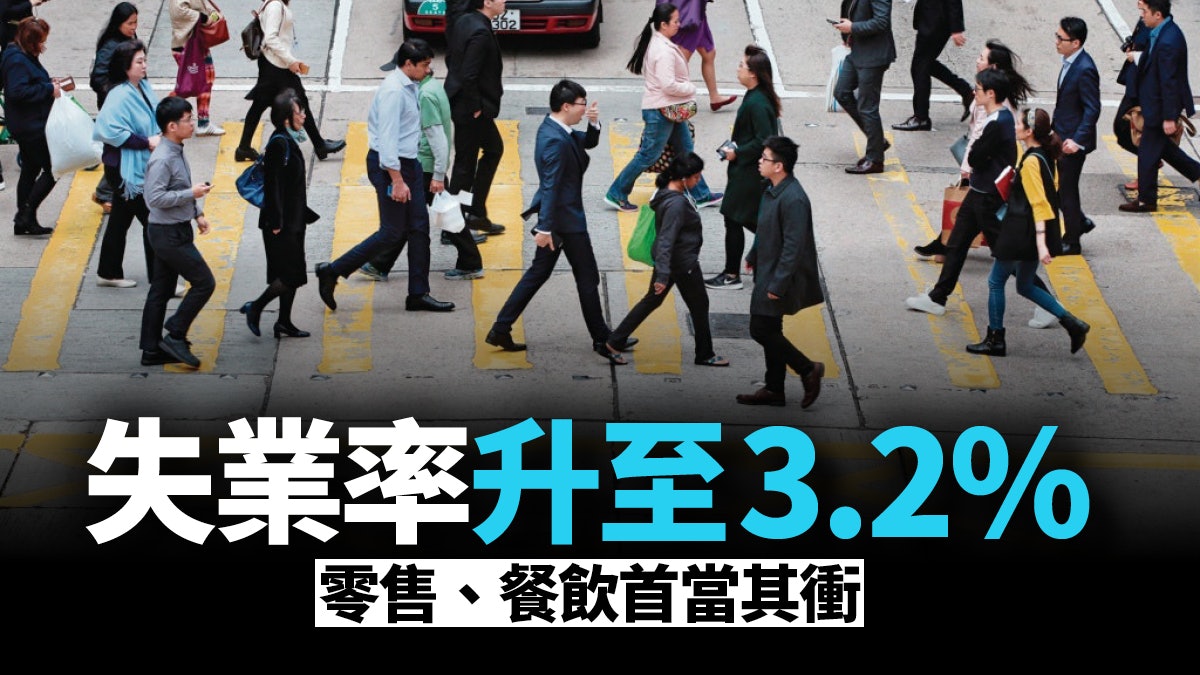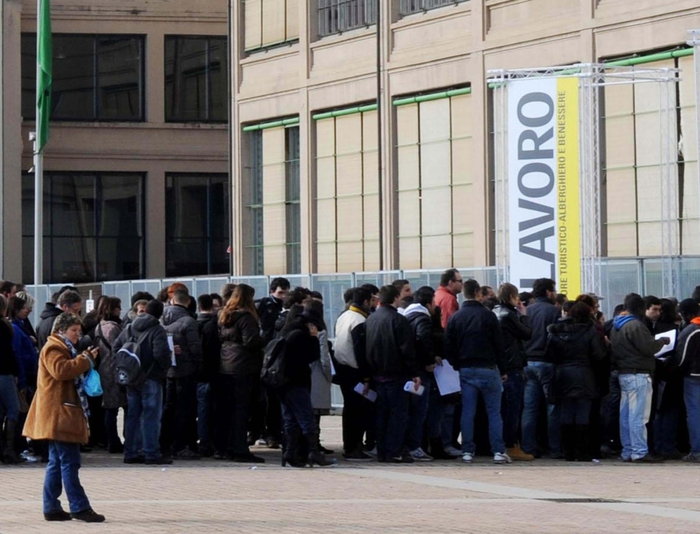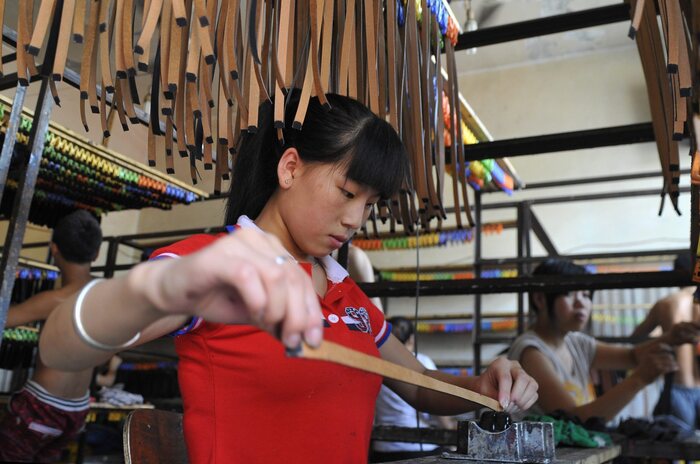01 perspective
Written by: Comment Editor
2019-12-18 18:12
Last updated: 2019-12-18 18:15The government announced on Friday (13) that the number of poor people reached 1.406 million. This Tuesday (December 17) announced that the unemployment rate rose to 3.2% from September to November. Among them, the catering service industry was the highest in eight years. The two sets of numbers are not unrelated.
Many factors affect the economy, including Sino-US trade frictions, but social conflict is at least one of the factors. The number of inbound tourists has been falling for many months, naturally affecting the tourism-related retail and catering industries. If citizens reduce their spending abroad due to the political atmosphere, even local merchants will be affected.
The government announced on Tuesday that the unemployment rate rose to 3.2% from September to November, an increase of 0.4 percentage points from the same period last year. Analyzing the unemployment rate by industry, the transportation, real estate, and education industries have not changed much. It can be seen that some industries have not been affected by the economic downturn or social conflict. The highest unemployment rate was in the building decoration, repair and maintenance industry, which reached 7.0%, and the retail, accommodation and food service industries also increased significantly. Taking into account the decline in the number of tourists and the social atmosphere, the retail, catering and other industries bear the brunt, and it can be reasonably inferred that the latter is affected by the former.
From September to November 2019, the unemployment rate rose to 3.2%, of which the unemployment rate in the retail, accommodation and food service industries rose to 5.2%, a new high in recent years. (Profile picture)
Single industrial structure
However, today's result, social conflict is only a superficial cause, and there is a structural cause underneath. Hong Kong has always been an export-oriented economy. Due to the impact of the external environment, the number of visitors to Hong Kong has declined in the past due to the global economic downturn. Although the causes of this trigger are different and are related to the continued social turmoil, in the final analysis, Hong Kong's economy is still too dependent on individual industries.
After de-industrialization in the last century, Hong Kong is dominated by four major industries, namely financial services, tourism, trade and logistics, and professional and industrial support services. Today, there are still 1.8 million employed people. However, these four industries are not without challenges. In addition to the changes in China and the international market, technological developments have made these industries need to adapt and even transform. Tsang proposed the "six major industries" in the years, advocating the promotion of culture and creativity, medical care, education, innovative technology, testing and certification, and environmental protection industries, but so far he has performed poorly.
The government is insufficient in promoting industrial diversification and transformation and upgrading. Once the number of visitors to Hong Kong decreases due to various reasons such as social conflicts and tensions between China and Hong Kong, the related practitioners will be affected, and it will be difficult for other industries to accommodate them for a while. The rigid industrial structure, coupled with the government's laissez-faire consortium to monopolize economic resources, labor can only bear the brunt of the economic downturn.
What's wrong with "single industrial structure"? Shi Yongqing: Pragmatism makes Hong Kong today
[Industrial Policy] Relying on the business community to follow the industry blindly—weak governments do not dare to do
[Industrial policy] The economic structure has not been transformed-is the Hong Kong Government "incompetent" or "ignorant"?
Bear the brunt of labor
Taking the catering industry as an example, the main costs include rents, food materials, water and electricity, and wages. The government's relief measures start with the reduction of water and electricity charges. Assuming that the prices of food materials remain the same, it is only rents and wages that can reduce costs. Although large consortia such as Swire Properties and Henderson Land are willing to deal with the situation at the merchant's discretion, according to the data in September and October of the past three years, it can be seen that the rents of retailers have not seen a decline. According to capital logic, unless a certain number of merchants close their businesses, real estate developers must find tenants, otherwise there will be no pressure to reduce rents. In order to reduce the risk of loss-making businesses, it is natural to start by controlling wage costs, such as freezing wages and layoffs.
The first phenomenon of labor abounds in capital markets. According to British government data in 2011, unemployment among the low-skilled workers was the worst in the economic recession. After the financial tsunami in 2008, not only did the low-educated workers in the United States bear the brunt, but it was also this population that benefited the most after the economic recovery.
Poverty and first distribution
The industrial structure and the logic of capital affect not only the loss of labor in the economic downturn, but also the issue of poverty in Hong Kong. Take the retail, lodging, and catering industries as an example. The number of employed people reaches 570,000, accounting for 15% of the total. However, many of these industries' profits are converted into rents, that is, into the pockets of real estate developers. In terms of the real wage index, of the eight major industries selected by the Census and Statistics Department, retail ranked fifth, and accommodation and catering ranked seventh, all significantly lower than the real estate leasing, finance and insurance industries.
To increase the income of grassroots workers, on the one hand, the government can make wage formulation more reasonable through policies such as the minimum wage and the right to collective bargaining; on the other hand, it must fundamentally change the economic structure, including increasing employment opportunities in emerging industries, and through education and Employment support assists workers in gaining relevant capabilities to transform and meet market needs.
Hong Kong people may be too accustomed to thinking that it is natural for workers to engage in low-skilled jobs and earn meager salaries. However, this does not have to be the case. Why can't we have more citizens who can devote themselves to culture and creativity, study innovative technologies and engage in environmental protection industries, but still get good salary? When up to 1.4 million Hong Kong people have a median monthly income of less than the median and are below the poverty line, when will our government be willing to make drastic reforms to create a more fair society?
[Poverty Report] Both poor and uneven governments need to distribute for the first time
[Poverty report] Wen Guoshifei, director of the 1.4 million poverty-stricken High Division
01 depth
Unemployment rate poverty line poverty alleviation committee 01 perspective





/cloudfront-eu-central-1.images.arcpublishing.com/prisa/QTVF3EOGLFBTPJL3YXHGH4CEFE.jpg)






/cloudfront-eu-central-1.images.arcpublishing.com/prisa/KMEYMJKESBAZBE4MRBAM4TGHIQ.jpg)


